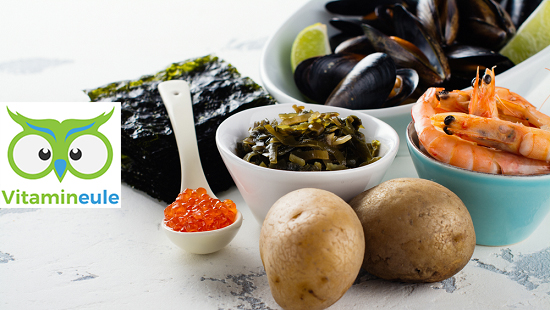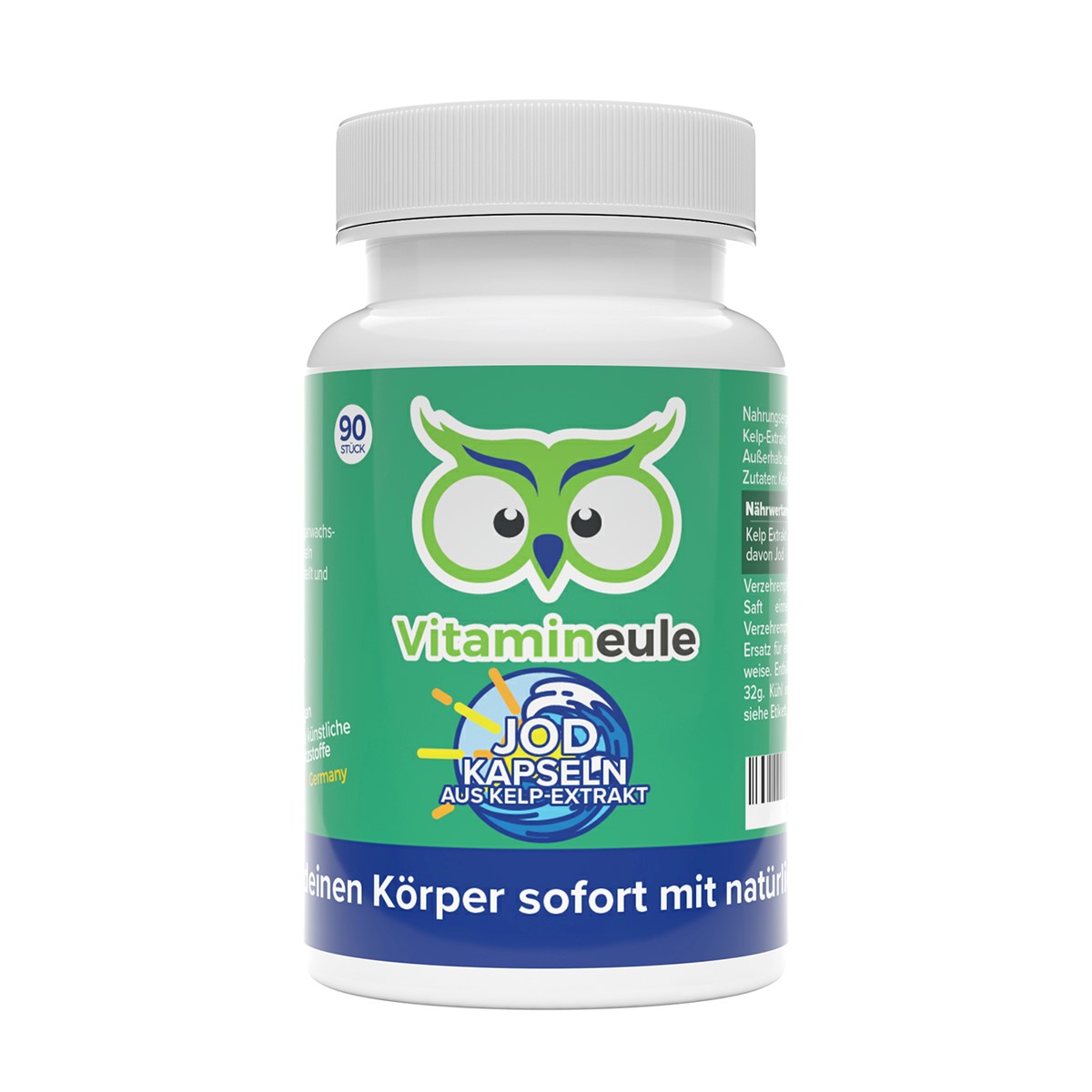

Team Vitamineule
Questions, wishes or suggestions? Simply contact us by e-mail or on Facebook.
1. the daily requirement of iodine
Iodine is an essential trace element. It is an essential part of the thyroid hormones. Unfortunately, iodine deficiency is one of the most common deficiencies. In Germany about 30% of the entire population is affected by a deficiency of this trace element. The need for iodine in the body is determined by the production of thyroid hormones. In general, the daily requirement of iodine depends on various factors. These include age, sex, body weight, height and above all the general metabolic situation.
The German Society for Nutrition (DGE) recommends a daily intake of 180-200 micrograms of iodine for adults. For a small child, the recommended amounts of iodine are naturally lower. However, the recommended daily intake increases during physical activity, as iodine is excreted through sweat. The recommended daily intake of iodine for pregnant and breastfeeding women is approx. 230 µg, as they have to supply their child as well.
2. what is iodine?
Iodine is an important trace element for the human organism. Since iodine is only present in very small quantities in the body, it is best to take it in with food every day. The body cannot produce iodine itself. However, the thyroid gland can store small amounts of iodine. In exceptional cases, the iodine stores can be used.
Tasks of iodine:
- Support of the thyroid gland function
- Production of thyroid hormones
- Maintenance of a normal energy metabolism
- brain development
- Baby's development (mental and physical)
- Neutralization of free radicals
- Fight against viruses, bacteria and fungi
- Maintenance of normal skin
3. which foods contain iodine?
Iodine is contained in almost all foods. However, it is sometimes found in very small quantities. Especially iodine-containing foods are those that come from the sea. These include seafood, fish and algae.
Foods with high iodine content: (data in µ/100g)
iodised table salt approx. 2000
Sea salt approx. 50
Haddock approx. 300
mussels, prawns approx. 130
Cod approx. 150
Saithe approx. 100
Redfish ca. 90
Herring approx. 50
Tuna approx. 50
Sole approx. 20
Champinions approx. 5
milk approx. 8
eggs approx. 8
4. iodine as food supplement
Iodine should normally be absorbed by the body daily. The best way to do this is naturally through a healthy and balanced diet. However, many people find it very difficult to cover the complete requirement of trace elements. Then iodine should be taken in addition to this in order to avoid a lack of iodine.
Iodine is available in the form of dietary supplements in stores. It is offered in the form of iodine capsules and iodine tablets. Both forms are easy to handle and quickly enter the circulation. However, iodine tablets are sold in pharmacies, which in many cases have been manufactured with artificial additives or abroad. Iodine capsules often contain only the active ingredient in a vegetable cellulose shell and can therefore be produced without fillers. Iodine capsules or iodine tablets should be taken with sufficient liquid (for example water or juice). It does not matter whether iodine is taken before or after a meal. However, if you have a sensitive stomach and cannot take iodine tablets or iodine capsules on an empty stomach, you should eat something first and then take the food supplements.
In general, it should always be ensured that the product was produced in Germany in order to guarantee a consistently high product quality. If you buy a preparation from Germany, you can be sure that the product was also produced safely and is of high quality.
Our recommendation:
Vitamineule® Iodine Capsules
In our online shop you will find our iodine capsules from Vitamineule®, which are completely free of artificial additives. Vitamineule® Iodine capsules contain 400µg iodine from kelp extract per capsule. Each can contains 90 capsules. In addition to fast & free shipping, we offer a voluntary six month return guarantee for all products.
5. conclusion: the daily requirement of iodine
Iodine is a trace element which is essential for the human body. It is needed for the production of the thyroid hormones thyroxine (T3) and triiodothyronine (T4). Since the organism cannot produce iodine itself, it must be taken in daily with food. The daily requirement of iodine depends on various factors such as sex, height and body weight. Those who cannot manage to absorb sufficient iodine can take iodine in the form of dietary supplements. These are available as iodine tablets or iodine capsules in stores.
Further sources:
- Iodine Basedow Syndrome
- Iodine-basedow Effect Due to Prolonged Use of Lugol Solution-Case Report
- Use of Antibacterial Agents To Elucidate the Etiology of Juvenile Oyster Disease (JOD) in Crassostrea Virginica and Numerical Dominance of an Alpha-Proteobacterium in JOD-affected Animals
- A PCR-based diagnostic assay for the detection of Roseovarius Crassostreae in Crassostrea Virginica Affected by Juvenile Oyster Disease (JOD)
- Efficacy of Adding a Physiotherapy Rehabilitation Programme to Arthroscopic Management of Femoroacetabular Impingement Syndrome: A Randomised Controlled Trial (FAIR)
- Peripheral T-lymphocytes in Juvenile Onset Diabetics (JOD) and in Maternity Onset Diabetics (MOD)
- [Iodine-Induced Hyperthyroidism]

